Practice theory is a theoretical perspective increasingly used across political science sub-disciplines. On Tuesday the 15th of December I had the pleasure to discuss with a range of colleagues how practice approaches can illuminate European diplomacy. In particular we discussed the benefits and disadvantages of the community of practice approach for the study of diplomacy as well as what methodological tools lend themselves to study diplomatic practices. The goal of the workshop was also to prepare a special issue on the theme, which will be forthcoming with the journal European Security.
Author Archives: admin
The G7 High Level Meeting on Maritime Security
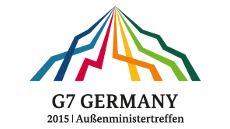 On December 14th the G7 held a High Level Meeting on Maritime Security under the presidency of Germany. The meeting titled “Enhancing Maritime Security – Connecting Regions – Governing the Commons was a follow up to the Lübeck Declaration on Maritime Security of the G7 Foreign Ministers from April this year. At the one day event over 150 experts discussed four vital themes in maritime security: Maritime domain awareness and information sharing, maritime dispute settlement, illegal fishing, and the role of regional organizations in the provision of maritime security. I had the pleasure to participate in the meeting and chair the roundtable on regional organizations. The roundtable featured representatives from the International Maritime Organization, the Indian Ocean Rim Association, as well as the government of Togo which is currently organizing a major African Union summit on the theme. In the closing discussion I presented a summary of the roundtable themes. I stressed four vital points for furthering the discussion on maritime security.
On December 14th the G7 held a High Level Meeting on Maritime Security under the presidency of Germany. The meeting titled “Enhancing Maritime Security – Connecting Regions – Governing the Commons was a follow up to the Lübeck Declaration on Maritime Security of the G7 Foreign Ministers from April this year. At the one day event over 150 experts discussed four vital themes in maritime security: Maritime domain awareness and information sharing, maritime dispute settlement, illegal fishing, and the role of regional organizations in the provision of maritime security. I had the pleasure to participate in the meeting and chair the roundtable on regional organizations. The roundtable featured representatives from the International Maritime Organization, the Indian Ocean Rim Association, as well as the government of Togo which is currently organizing a major African Union summit on the theme. In the closing discussion I presented a summary of the roundtable themes. I stressed four vital points for furthering the discussion on maritime security.
The Luebeck declaration already highlighted the importance of the global oceans for economic prosperity. Further elaborating the link between maritime security and the blue economy is vital for promoting security at sea. If maritime security stands for the risks presented by the oceans, the blue economy emphasizes its opportunities. Recognizing the economic potential of the sea will enable to address the problem known as “sea blindness” and to present a convincing case to national publics, governments and states, including landlocked states, that maritime security is a priority area that needs investment and the will to cooperate.
Maritime security does not have a clear institutional home. It is an Inter-agency challenge and requires military-civil and inter-sectional cooperation. Stronger institutions at the country, regional as well as global level are required. But there is also the need to better clarify roles and responsibilities of each level. Country ownership is vital, yet, maritime security is a transnational challenge and many states will require assistance through capacity building and technology transfer from the international community. The G7 will continue to play an important role in driving the discussion on the global maritime security architecture forward and clarifying the rules and responsibilities of different national, regional and global institutions.
If maritime security requires better cooperation between states, trust and confidence building mechanisms, in particular at the regional level, are the key. There is clear evidence for the importance of mechanisms which include, but are not limited to, informal governance processes, such as the Contact Group on Piracy off the Coast of Somalia, Codes of Conduct, such as those signed in Djibouti and Yaounde, joint exercises, but also intra-regional transfer of skills and technology, through capacity building, training, education and research. These mechanisms should be strengthened to build regional maritime security communities.
The fight against piracy is not over yet. Both the Gulf of Guinea and the situation in the Gulf of Aden will require continued attention and sustained efforts of the international community. The regional maritime security architecture in both regions will need to be strengthened. The participants welcomed the financial contribution of Germany for the implementation of the Yaounde Code of Conduct and the efforts of the government of Togo in preparing the Lome Summit on maritime security and development. In particular the Lome Summit of the African Union to be held next year will be an important milestone for African maritime security and ensuring that all forms of maritime crime in the continents waters will be effectively addressed.
The participants welcomed the strong leadership of the G7. The Luebeck declaration presented an important step for the discourse on maritime security. It was, however, emphasized that if the 21st century is a maritime century, the current discussion can only be the beginning. Sustained efforts in particular on elaborating the future of the global maritime security governance architecture will be required and the dialogue among maritime security experts, including university based scholars, needs to be intensified.
Sri Lanka’s Galle Dialogue
 From the 23rd to the 24th November I attended the Galle Dialogue 2015, held in Galle, Sri Lanka. The Galle Dialogue is a major international multilateral meeting of navies in the Indian Ocean. Organised by the Sri Lankan navy, the dialogue attracted this year 300 participants from over 37 nations. The sixth installment of the dialogue, focussed on the theme “Secure seas through greater maritime cooperation”. The conference was opened by the prime minister of Sri Lanka, and included, among others, presentations by India’s chief of naval staff, Nigeria’s chief of naval staff, the deputy chief of staff from the Pakistan Navy, the State Minister of Defense of Sri Lanka, as well as representatives of UNHCR, IOM, and UNODC. The first day focussed on the contributions of different navies to maritime security in the Indian Ocean, while on the second day the issue of migration and international corporation to tackle ocean borne crime were discussed. As the only academic presenting at the conference, I discussed in my lecture the relationship between maritime security and the blue economy, and how more cooperative ocean governance structures might be set up. I drew on the results of the lessons learned project of the Contact Group on Piracy off the Coast of Somalia as well as my ongoing ESRC funded project on maritime security governance. Further information on the Galle Dialogue, including the full program, papers, and videos, is available here.
From the 23rd to the 24th November I attended the Galle Dialogue 2015, held in Galle, Sri Lanka. The Galle Dialogue is a major international multilateral meeting of navies in the Indian Ocean. Organised by the Sri Lankan navy, the dialogue attracted this year 300 participants from over 37 nations. The sixth installment of the dialogue, focussed on the theme “Secure seas through greater maritime cooperation”. The conference was opened by the prime minister of Sri Lanka, and included, among others, presentations by India’s chief of naval staff, Nigeria’s chief of naval staff, the deputy chief of staff from the Pakistan Navy, the State Minister of Defense of Sri Lanka, as well as representatives of UNHCR, IOM, and UNODC. The first day focussed on the contributions of different navies to maritime security in the Indian Ocean, while on the second day the issue of migration and international corporation to tackle ocean borne crime were discussed. As the only academic presenting at the conference, I discussed in my lecture the relationship between maritime security and the blue economy, and how more cooperative ocean governance structures might be set up. I drew on the results of the lessons learned project of the Contact Group on Piracy off the Coast of Somalia as well as my ongoing ESRC funded project on maritime security governance. Further information on the Galle Dialogue, including the full program, papers, and videos, is available here.
Talk at SOAS
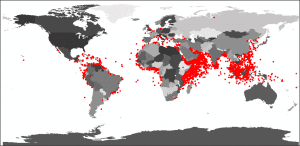 On the 11th of November I gave a talk in the research seminar series of the Department of Politics and International Studies of SOAS. I presented my study on the piracy high risk area and the politics of this zone. Largely focusing on the empirical side of the story, I aimed at showing what kind of politics and sovereignty the establishment of such a zone of exception entails. Details of the event are available here, and you can listen to the talk here.
On the 11th of November I gave a talk in the research seminar series of the Department of Politics and International Studies of SOAS. I presented my study on the piracy high risk area and the politics of this zone. Largely focusing on the empirical side of the story, I aimed at showing what kind of politics and sovereignty the establishment of such a zone of exception entails. Details of the event are available here, and you can listen to the talk here.
Networked World? Conference at ETH Zuerich
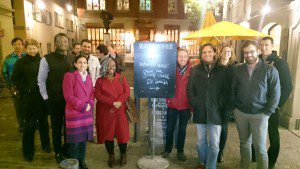 How do international and regional organizations, states and non-governmental organizations cooperate and relate to each other in security governance? This was the main question of a two day conference hosted by the Center for Security Studies of the ETH Zurich. The conference, held from 6th to 7th of November 2015, featured 19 presentations and was organized in four sections: 1) Global-regional, 2) inter-regional, 3) intra-regional links and 4) critical perspectives. I contributed to section four and argued in my presentation that assemblage theory gives us a great tool to study the diverse relations of new modes of security governance. Discussing the diverse relations that the piracy high risk area entails, I argued for the appreciation of complexity and grounding analysis in practical relations. The full conference program is available here.
How do international and regional organizations, states and non-governmental organizations cooperate and relate to each other in security governance? This was the main question of a two day conference hosted by the Center for Security Studies of the ETH Zurich. The conference, held from 6th to 7th of November 2015, featured 19 presentations and was organized in four sections: 1) Global-regional, 2) inter-regional, 3) intra-regional links and 4) critical perspectives. I contributed to section four and argued in my presentation that assemblage theory gives us a great tool to study the diverse relations of new modes of security governance. Discussing the diverse relations that the piracy high risk area entails, I argued for the appreciation of complexity and grounding analysis in practical relations. The full conference program is available here.
Exclusive Expertise – A workshop @ Copenhagen University
 What is the status of expertise in conflict resolution? Which crisis situations lead to the assembling of what forms of expertise and what gets included and excluded? Those were the questions addressed at an authors workshop organized by the Center for the Resolution of International Conflicts (CRIC). The two day event (22.-23.10.2015) brought together a range of experts in different fields of conflict studies from across the globe. Participants included, among others, Pinar Bilgin, Anna Leander, Ole Waever, Tom Biersteker, Trine Villumsen Berling, Keith Krause, David Chandler, and Peter Vale.
What is the status of expertise in conflict resolution? Which crisis situations lead to the assembling of what forms of expertise and what gets included and excluded? Those were the questions addressed at an authors workshop organized by the Center for the Resolution of International Conflicts (CRIC). The two day event (22.-23.10.2015) brought together a range of experts in different fields of conflict studies from across the globe. Participants included, among others, Pinar Bilgin, Anna Leander, Ole Waever, Tom Biersteker, Trine Villumsen Berling, Keith Krause, David Chandler, and Peter Vale.
The discussion demonstrated how diverse the field of conflict expertise is and how varied the forms of knowledge included are. The manuscripts presented will be published as an edited volume in 2016. At the workshop I presented a reflection on Somali piracy expertise and how it has changed over the life cycle of the Somali piracy crisis on the basis of my own experiences. Here is the abstract of the paper titled ‘Experts in an Adventure with Pirates. The assembling of Somali piracy expertise’:
The 2012 animated comedy “The Pirates! In an Adventure with Scientists!” tells the story of an encounter of a pirate crew with a scientist, set to be a certain Charles Darwin. The encounter leads to an unusual alliance that results in Darwin winning the “scientist of the year” award and the Pirate Captain succeeding in the “pirate of the year” competition. This chapter tells the story of an encounter of experts with Somali pirates set roughly at the same time when the movie hit the cinemas. I recast how different constellations of Somali piracy expertise were assembled in response to the emerging problematic situations. My story is told from the inside out. I start with a range of personal reflections on how I assumed the role of a piracy expert and use a range of personal encounters with fellow experts and with the governors of counter-piracy to develop a narrative of how Somali piracy knowledge was made. The results is an incoherent narrative of how piracy knowledge has moved as the crisis unfolded and was increasingly managed. I recast a movement from experience based questions (“best practices” on how to prevent and manage a piracy attack), to questions concerning the ‘legal finish’ (how to prosecute piracy suspects?), the long-term management and prevention of piracy (what are the causes of piracy and how can we prevent the emergences of piracy?), reflexive questions (what lessons can be learned from counter-piracy?) and to the problem of exit strategies (is the piracy crisis over and can the system put in place be reversed?). Following this life-cycle of the piracy crisis allows as to understand how different problematic situations assemble distinct expertise and how the expertise that matters changes over time.
Maritime Security Course by ESDC
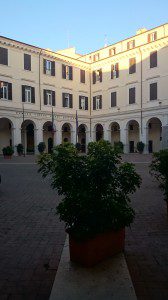 Maritime Security has made it into the curriculum of the European Security and Defense College (ESDC). Following up on the action plan of the European Maritime Security Strategy (EUMSS), the ESDC has launched three training courses on maritime security held in Spain, France and Italy. This a pilot phase and the aim is to develop a joint curriculum for the next years.
Maritime Security has made it into the curriculum of the European Security and Defense College (ESDC). Following up on the action plan of the European Maritime Security Strategy (EUMSS), the ESDC has launched three training courses on maritime security held in Spain, France and Italy. This a pilot phase and the aim is to develop a joint curriculum for the next years.
The Italian Center for High Defence Studies organized a maritime security course from 19th to 23rd of October in Rome. The first day explained the EUMSS and put it into context, the second day was devoted to the EU’s External Action in the field of maritime security. The remaining days included a session on piracy, on maritime domain awareness, EUNAVFOR Med as well as military cooperation in maritime security. The course that attracted 35 professionals from across Europe was concluded with an exercise. At the course I gave three presentations. On day one I discussed the Action Plan of the EUMSS in the light of its implementation, on day two I introduced the problems linked to maritime security capacity building with a particular focus on sustainability, politics and ownership. My presentation on day three concerned the lessons from Somali piracy giving an overview of the results of the lessons learned project for the Contact Group on Piracy off the Coast of Somalia.
Workshop on Translations
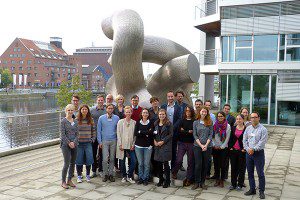 From 8–9 October 2015 I attended a workshop in Duisburg titled “Translations in World Politics”. The workshop brought together a crowd from IR, policy studies, and Science and Technology Studies to re-think how the concept of translation can made fruitful for the study of politics. The papers presented the different ways of using the concept. Some used it to refer to linguistic translation, while other drew on the extensive meaning as shifting situations and inscriptions. In the workshop I presented a first draft of my paper in which I theorize the High Risk Area controversy in the Contact Group on Piracy off the Coast of Somalia. Starting out from assemblage theory and an understanding of translation as territorialization and de-territorialization, I argued that the best practice manual (BMP4) and the map of the High Risk Area present inscriptions of the entire counter-piracy assemblage.
From 8–9 October 2015 I attended a workshop in Duisburg titled “Translations in World Politics”. The workshop brought together a crowd from IR, policy studies, and Science and Technology Studies to re-think how the concept of translation can made fruitful for the study of politics. The papers presented the different ways of using the concept. Some used it to refer to linguistic translation, while other drew on the extensive meaning as shifting situations and inscriptions. In the workshop I presented a first draft of my paper in which I theorize the High Risk Area controversy in the Contact Group on Piracy off the Coast of Somalia. Starting out from assemblage theory and an understanding of translation as territorialization and de-territorialization, I argued that the best practice manual (BMP4) and the map of the High Risk Area present inscriptions of the entire counter-piracy assemblage.
Maritime Security Section @ EISA
Maritime Security Studies is a thriving field of research that not only addresses pressing political issues, but entails a fascinating set of scholarly questions, concerning territory, knowledge, sovereignty and international cooperation. Drawing on the success of earlier meetings (workshops in Cardiff and Geneva, and a section at the 2014 WISC conference in Frankfurt), maritime security scholars from across Europe met in the frame of the 9th Pan-European Conference on International Relations organized by the European International Studies Association. In six panels and one roundtable we discussed from the 23. to 26.9 the rise of maritime security strategies, challenges within distinct regions, and maritime threats such as illegal migration, piracy and boundary disputes. At the roundtable we discussed the need for maritime security studies to go into two directions: To theorize more, but to recognize that good theory is always anchored in practical problems and practice. We were particularly delighted to welcome Michel Soula from NATO headquarters for the section. A full overview of the program is available here.
Understanding the African Standby Forces
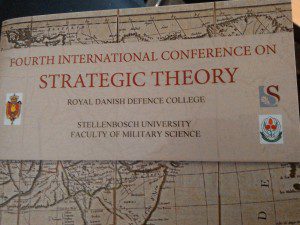 What is the state and future of the African Standby Forces (ASF)? And what should be the main purpose of the forces, peacekeeping, rapid crisis responses, or addressing the broader range of security risks? This was the core theme of the 4th international conference on strategic theory held in Stellenbosch from 16th to 18th September. The event was organized by Stellenbosch University in conjunction with the Royal Danish Defence College and broad together academics, analysts, diplomats and military representatives to discuss the ASF. It quickly emerged that there are quite different viewpoint on the ASF, in particular whether it should be seen as success or failure. From a military viewpoint, the way that the ASF could potentially respond to contemporary crisis situations remains limited. Yet, on the positive side, a substantial number of troops have been trained, and forces have gained much experience in collaboration. In my own contribution to the conference, I asked for the role that the ASF can play in maritime security. I argued for the importance of mainstreaming maritime security and that the issue domain should be part of the discussion of the ASF. The ASF could be a major institutional structure for strengthening maritime security collaboration, in particular for joint law enforcement operations or maritime domain awareness. Further Information and the full conference agenda is available here.
What is the state and future of the African Standby Forces (ASF)? And what should be the main purpose of the forces, peacekeeping, rapid crisis responses, or addressing the broader range of security risks? This was the core theme of the 4th international conference on strategic theory held in Stellenbosch from 16th to 18th September. The event was organized by Stellenbosch University in conjunction with the Royal Danish Defence College and broad together academics, analysts, diplomats and military representatives to discuss the ASF. It quickly emerged that there are quite different viewpoint on the ASF, in particular whether it should be seen as success or failure. From a military viewpoint, the way that the ASF could potentially respond to contemporary crisis situations remains limited. Yet, on the positive side, a substantial number of troops have been trained, and forces have gained much experience in collaboration. In my own contribution to the conference, I asked for the role that the ASF can play in maritime security. I argued for the importance of mainstreaming maritime security and that the issue domain should be part of the discussion of the ASF. The ASF could be a major institutional structure for strengthening maritime security collaboration, in particular for joint law enforcement operations or maritime domain awareness. Further Information and the full conference agenda is available here.